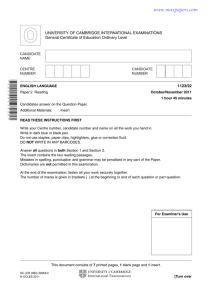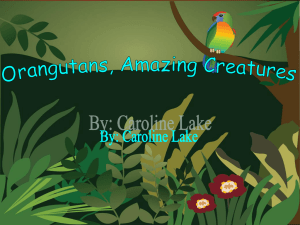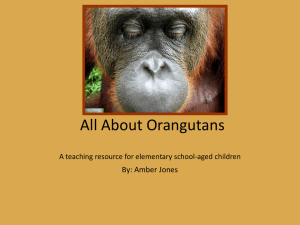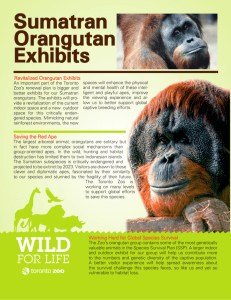www.XtremePapers.com UNIVERSITY OF CAMBRIDGE INTERNATIONAL EXAMINATIONS General Certificate of Education Ordinary Level 1123/22
advertisement
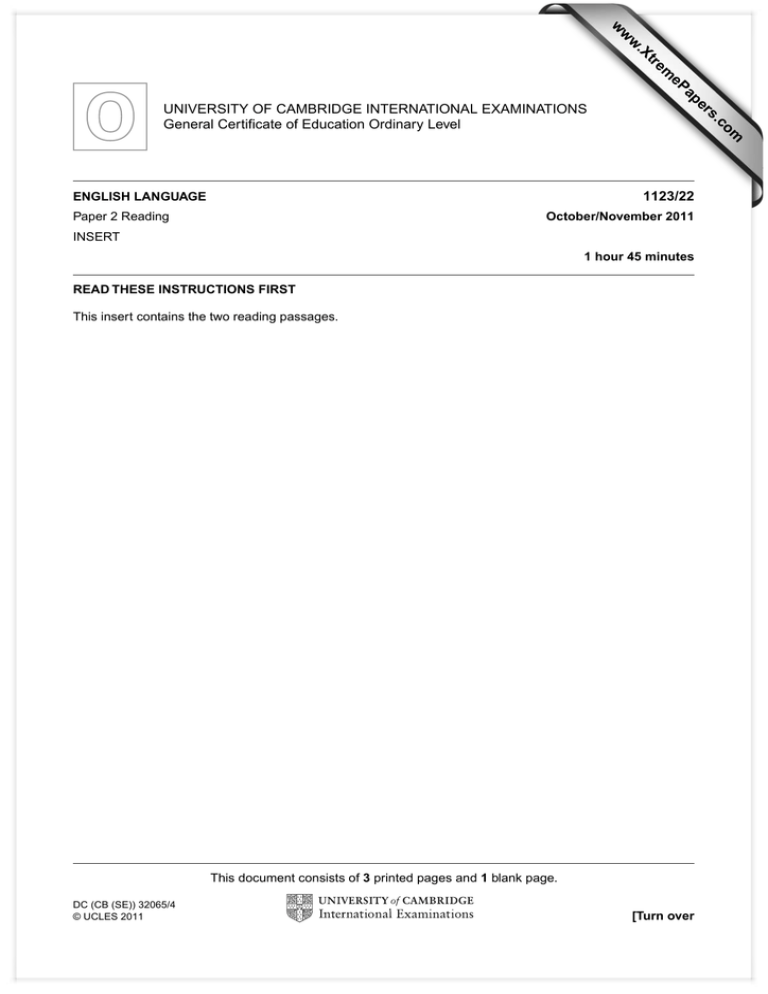
w w ap eP m e tr .X w om .c s er UNIVERSITY OF CAMBRIDGE INTERNATIONAL EXAMINATIONS General Certificate of Education Ordinary Level 1123/22 ENGLISH LANGUAGE Paper 2 Reading October/November 2011 INSERT 1 hour 45 minutes READ THESE INSTRUCTIONS FIRST This insert contains the two reading passages. This document consists of 3 printed pages and 1 blank page. DC (CB (SE)) 32065/4 © UCLES 2011 [Turn over 2 Passage 1 – Orangutans 1 Many people know that orangutans are the biggest tree-dwelling animals in the world, and uncannily like our own human species – hence their name, which means ‘forest people’. But what is perhaps less well known is the alarming fact that the global population of orangutans has halved in the past two decades. How has this come about? 2 5 There are laws governing the cutting down of trees, but sometimes trees are axed by people who are part of an illegal market in wood, and this illegal logging destroys the natural habitat of orangutans. Additional damage is caused to their habitat by people who burn down extensive areas of forest in a bid to create more land for agriculture. The displaced orangutans are left hungry by the destruction of their food source and, ironically, they are often branded as pests by farmers whose crops then become their only food option. Mindful of potential loss of profits, 10 farmers carry out vicious extermination programmes of orangutans. The knock-on effect of this is that frequently money is offered for killing orangutans; it is possible to understand such misguided behaviour, as the reward will certainly be more than a week’s salary. Sometimes the mothers are killed for food, and their killing is rarely humane: they can be beaten to death 15 or doused in petrol and set on fire. On other occasions the babies are captured as pets. 3 But the biggest threat to orangutans today comes from the clearing of their habitat for palm oil plantations, which unfortunately flourish best in the lowland forest areas favoured by orangutans. It is estimated that, in some parts of the world, a staggering one in ten products on sale in supermarkets contains palm oil, items ranging from soap and lipstick to margarine and detergent. Because food made with palm oil is low in the fatty acids associated with heart 20 disease, more and more areas inhabited by orangutans are cleared. Healthy food may be provided, but orangutans suffer. Furthermore, in a laudable desire to combat carbon emissions, palm oil is produced on a grand scale to satisfy the demand for biofuels manufactured from it, again at the expense of orangutans. 4 The world has become aware of the plight of orangutans, albeit dangerously late. Many 25 governments are becoming pro-active in their attempt to halt the extinction of these beautiful creatures by raising public awareness. Individual palm oil companies are being asked to consider more than mere profit, and to ensure that their products come from sources which are not detrimental to orangutans. Some national parks which are already homes to orangutans are being increased in size to extend them even greater hospitality, and better training and 30 equipment are being offered to park rangers there to help in the conservation programme. Organisations dedicated to looking after orangutans – e.g. the World Wildlife Fund and the Orangutan Foundation International – are increasing in number, and many such organisations are involved in planting new trees in the already ravaged rainforests formerly favoured by orangutans. 35 5 Ordinary people are invited to participate in conservation schemes by working voluntarily in an orangutan habitat – even as short a period as three weeks can make a difference. In some areas, orangutan rescue centres have been established in desperate and often lastditch attempts to save lives. Unsurprisingly, the cost of caring for even one infant orangutan is very high; the fact that a single care centre rescues dozens of babies a year means that 40 the bill is often staggering. To make some inroads into these costs, funding organisations encourage people to adopt an orangutan, in return for which they might receive such items as a photograph of the adoptee or a certificate of adoption. School students are invited to be responsible for a particular day in a park’s calendar: they instigate a fund-raising programme to protect the park for that day by paying for police officers to guard against hunters or to 45 patrol rivers in boats. 6 Such news is encouraging, but we must ensure that it is not a case of too little, too late. Perhaps the extent of humanity’s concern for the plight of the orangutan is a measure of the extent of humanity’s concern for the beautiful planet we inhabit. © UCLES 2011 1123/22/INSERT/O/N/11 3 Passage 2 – The Chinese Money-Lender 1 Peter stood on the balcony of his son’s apartment and sighed contentedly. Peter and his wife had been concerned when their son, Christopher, had announced his intention to emigrate but, Peter reflected, it had been the right decision after all, despite his parents’ original misgivings. This country offered unsurpassed employment opportunities. Christopher’s apartment was situated in a lively and increasingly popular location where accommodation was relatively inexpensive, there was an excellent public transport service and new restaurants and cafes were springing up all around. 5 2 Soon Peter and his wife, Marian, were on the bus for yet another trip to the market recommended by the guide books as a priority for tourists. Stalls selling fabrics in a plethora of sizes and colours were interspersed with food stalls, their tantalising aromas wafting in 10 all directions. Peter bought an impressive warrior carved out of dark wood from a stallholder who assured him that the purchase was an opportunity not to be missed. At another stall, he purchased a tiny green tortoise which, the stallholder claimed, was made of genuine jade. Marian hid her impatience; she did not share her husband’s love of shopping and, besides, 15 she was less inclined to be swept away by smooth sales talk. 3 As they strolled on, Peter’s attention was suddenly drawn by an antiques shop, crowded in amongst hardware stalls and food outlets. A glint of metal caught his eye and he quickly entered the shop, discovering that the source of his curiosity was a somewhat mysterious-looking ornament, the figure of a man, no more than three inches high, seated at a solid-looking desk. Peter peered intently at it. ‘It’s a Chinese money-lender,’ said the young shop assistant who, it 20 seemed, had eagerly appeared out of nowhere. Closer inspection showed the money-lender’s desk to be stamped on the front and the base with indecipherable inscriptions. There was an over-laden moneybag at one end, its contents spilling over the desk, and an abacus balanced on the money-lender’s knee. The gilded figure, hunched over the desk, with palms upturned as if beseeching yet more money, glittered in the shop lights. One look at his face – spectacles 25 shining on his nose, mouth agape, trembling beard – revealed the satisfaction of a deal well concluded, and the desire for more money. He cried out to become another purchase. 4 The shop assistant turned his full attention towards the bewitched Peter. Simultaneously he positioned himself so that Peter could not see Marian’s furrowed brow, her silent rebuke to Peter that enough money had already been spent that day. ‘I will charge you a fair price for this 30 money-lender,’ promised the shop assistant. ‘Peter, it’s time we were heading back for lunch,’ warned Marian. ‘Whoever buys him will never have ill-fortune,’ promised the shop assistant. The money-lender had cast his spell, and within minutes Peter left the shop carrying his purchase, as the smiling shop assistant waved a cheerful farewell. 5 On the way back, Marian eventually saw the humour in the situation. Her awkward silence 35 was short-lived and she soon linked her arm affectionately through her husband’s, her free hand holding the jade tortoise and the wooden warrior, while Peter clutched the Chinese money-lender. ‘You were really talked into that!’ she laughed. ‘Ah, but it’s a unique work of art,’ replied Peter, ‘and who knows what it will bring?’ 6 A few days later, their holiday over, it was their own house they were entering, dropping their 40 bulging suitcases gratefully to the floor. Peter quickly unpacked the tortoise, the wooden warrior and, of course, the Chinese money-lender, while Marian took up the more mundane task of opening the pile of mail which had accumulated since their departure. In the living room, Peter, with the utmost care, was tenderly positioning the Chinese money-lender on a shelf. Now what was the best angle at which to display him for maximum aesthetic effect? He heard the rustling 45 of paper and the ripping open of envelopes. Reluctantly he dragged his attention away from his new friend as he heard Marian’s voice from the hallway: ‘Peter, I can hardly believe this. I’ve won the top cash prize in that competition I entered before we went away … I can hardly believe it!’ Smiling, Peter adjusted the position of the Chinese money-lender yet again by a fraction of an inch. ‘Oh, but I can believe it,’ he said. 50 © UCLES 2011 1123/22/INSERT/O/N/11 4 BLANK PAGE Permission to reproduce items where third-party owned material protected by copyright is included has been sought and cleared where possible. Every reasonable effort has been made by the publisher (UCLES) to trace copyright holders, but if any items requiring clearance have unwittingly been included, the publisher will be pleased to make amends at the earliest possible opportunity. University of Cambridge International Examinations is part of the Cambridge Assessment Group. Cambridge Assessment is the brand name of University of Cambridge Local Examinations Syndicate (UCLES), which is itself a department of the University of Cambridge. © UCLES 2011 1123/22/INSERT/O/N/11
